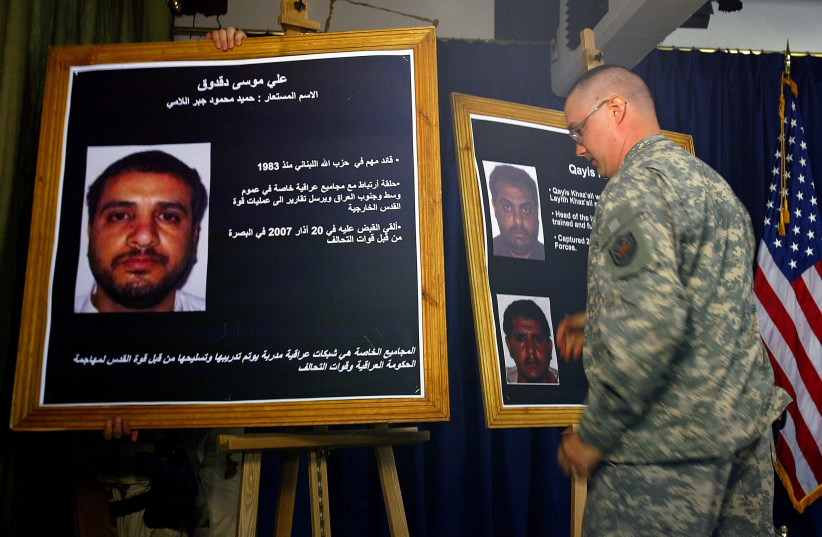The son of the head of Hezbollah's terrorist operations near the Syrian-Israeli border was eliminated in an alleged Israeli drone strike in western Syria on Friday, according to Syrian reports.
On Friday afternoon, Syrian media reported that four people were killed in an alleged Israeli airstrike targeting a vehicle in Madinat al-Baath in the Quneitra region of western Syria, just a few kilometers from the Syrian-Israeli border.
A few hours later, Hezbollah announced that three of its members, Ali Idris Salman "Abbas," Hussein Issam Taha “Abu Turab,” and Hassan Ali Daqduq “Jawad” were killed "on the road to Jerusalem," although the announcement did not say where or in what circumstances.
The Syrian Capital Voice news site reported that the three were killed in the drone strike in western Syria alongside Muhammad Anas al-Tamer, one of the commanders of the Arab Nationalist Guard, a pan-Arab militia aligned with the Assad regime.
The ANG announced on Friday that Tamer had been killed, although neither did their announcement say where or how.

Tamer was one of the founders of the Arab Nationalist Guard, but had since become a central part of Hezbollah's Golan File (Unit 142), according to the Syrian Ain al-Sham news account.
The Capital Voice published video purporting to show a funeral service being held for the three Hezbollah terrorists at a shrine in Set Zaynab, an Iranian stronghold near Damascus, before their bodies were transported to Lebanon.
According to the report, the four terrorists had traveled from Set Zaynab toward the Syrian-Israeli border, where they met other leaders of Iran-backed militias; they were hit by the drone strike while heading back to Set Zaynab.
Who is Ali Mussa Daqduq?
Hassan Ali Daqduq, one of the three Hezbollah members killed, is the son of Ali Mussa Daqduq, also known as Abu Hussein Sajid.
In 2019, the IDF reported that Daqduq was heading Hezbollah's efforts to establish terrorist infrastructure near the Syrian-Israeli border, efforts referred to by Israeli officials as the "Golan File."
According to the military, Daqduq was central in terrorist operations against the IDF in southern Lebanon from 2003-2006 before moving to Iraq and helping to build up terrorist operations against US forces in the region.
In 2007, he was arrested by US forces in Iraq on charges of orchestrating an attack on US troops in Karbala in which five soldiers were killed, although he was later transferred to Iraqi custody and released in 2012. After his release, he trained Hezbollah's special forces until he was given command of the Golan File in 2018.
Tensions rise along northern border
Shortly after the airstrike on Friday was reported, rocket sirens and drone infiltration alerts sounded in the northern Galilee in and near Kiryat Shmona in northern Israel.
The reported airstrike came a day after two rockets were fired from Syria toward the Golan Heights. The IDF said it responded to the rocket fire with strikes on sites in Syria, with Syrian media reporting on Thursday evening that Israeli artillery targeted sites near the town of Hadar in Quneitra.
A little less than a week ago, two members of Iran's Islamic Revolutionary Guard Corps were killed in alleged Israeli airstrikes which targeted sites near Damascus early Saturday morning, according to the IRGC.
The two were identified as Mohammad Ali Ataee Shoorche and Panah Taqizadeh, with the IRGC saying they were carrying out an "advisory mission" in Syria.
